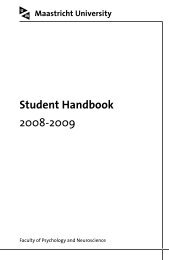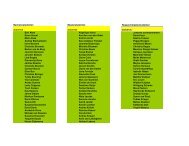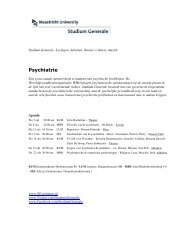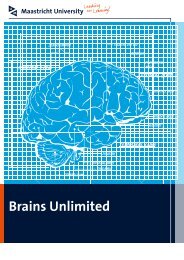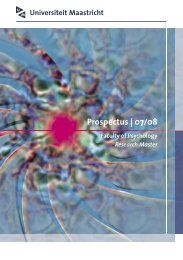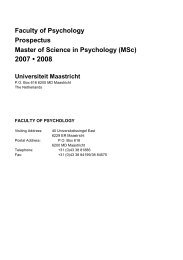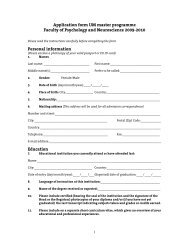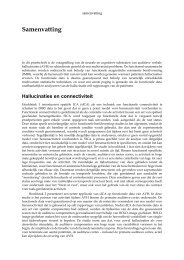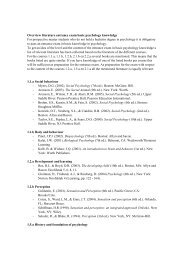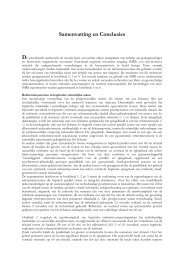Prospectus | 08/09 - Psychology and Neuroscience - Maastricht ...
Prospectus | 08/09 - Psychology and Neuroscience - Maastricht ...
Prospectus | 08/09 - Psychology and Neuroscience - Maastricht ...
You also want an ePaper? Increase the reach of your titles
YUMPU automatically turns print PDFs into web optimized ePapers that Google loves.
Chapter 4 - Specialization Neuropsychology<br />
Form of Assessment<br />
Open book, multiple choice exam consisting of questions resembling the exercises<br />
(general theory, some elementary computations, <strong>and</strong> interpretation of computer<br />
output).<br />
| 541NP Cognitive Development – 3 credits<br />
Coordinator: Petra Hurks, Neuropsychology & Psychopharmacology (FPN), Phone 38 84269,<br />
40 Universiteitssingel East, Room 2.747, E-mail: pm.hurks@psychology.unimaas.nl<br />
77<br />
Description of the Course<br />
This course focuses on brain-behaviour relationships in children <strong>and</strong> adolescents. It<br />
addresses the range from ‘normal’, ‘borderline pathology’, via focused <strong>and</strong> selective<br />
problems, to children with neurodevelopmental or neuropsychiatric diseases. A<br />
thorough underst<strong>and</strong>ing of normal cognitive development is essential before issues<br />
in abnormal development may be considered. What neurobiological or psychosocial<br />
mechanisms can be identified that may lie at the basis of this difference between<br />
normal <strong>and</strong> abnormal development? Relevant theories, state-of-the-art research, <strong>and</strong><br />
clinical approaches (e.g., treatment protocols) will be evaluated while addressing<br />
this question. In addition, students will be broadly acquainted with typical research<br />
methods that are custom in the area of cognitive development, such as cross-sectional<br />
<strong>and</strong> longitudinal designs, <strong>and</strong> the statistical strategies that are used to make inferences<br />
from such studies.<br />
Literature<br />
Journal articles <strong>and</strong> book chapters.<br />
Instructional Approach<br />
Tutorial group meetings.<br />
Form of Assessment<br />
Written assignment <strong>and</strong> oral presentation.<br />
| 542NP Stress, the Brain <strong>and</strong> Psychopathology– 3 credits<br />
Coordinator: Rob Markus, Neuropsychology & Psychopharmacology (FPN), Phone 38 82474,<br />
40 Universiteitssingel East, Room 3.777a, E-mail: r.markus@psychology.unimaas.nl<br />
Description of the Course<br />
It has become increasingly clear that stress is one of the most important triggers<br />
for cognitive-affective <strong>and</strong>/or psychiatric disorders including depression, anxiety,<br />
schizophrenia <strong>and</strong> dementia. In addition, a tremendous amount of biological <strong>and</strong><br />
cognitive-psychological research has been conducted on the onset <strong>and</strong> course of such<br />
stress-related disorders. Cognitive-oriented psychologists have shown that the chance<br />
of developing stress-related complaints is amplified by the utilization of negative <strong>and</strong>



